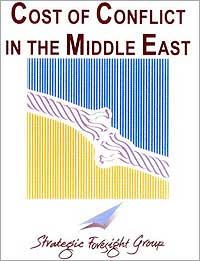MEDIA


For the first time in sixty years, a detailed assessment of economic, human, military, environmental, social, political, diplomatic, psychological, and all other costs and benefits of potential peace in the Middle East is made using 97 different parameters. This is an innovative document fully presented in the form of graphs and diagrams. It demonstrates the power of numbers to change the minds of people.
As the United States and the international community prepare for fresh policy initiatives in the Middle East, this is an essential tool for political leaders and negotiators. It is also a great resource for scholars interested in the region as well as those looking for innovative approaches to peace and conflict analysis anywhere in the world.
In the last decade alone, the Palestinian people have lost almost 5,000 lives, close to $40 billion in income opportunity, 20 million square metres of agricultural land, and 100 million man-hours in crossing at Ramallah. Moreover, almost 1.7 million of the 4 million residents of Gaza and the West Bank are refugees.
The report is not confined to the Israeli-Palestinian conflict. It also includes costs related to conflicts in Iraq and Lebanon as well as the cold war between Iran and Israel. It points out that Israel, almost all Arab countries and Iran would have all had double their present level of per capita income and Iraq would have had four times its per capita income, had there been peace since 1991. It also provides estimates of expected increase in income and economic as well as non-economic opportunities for all people in the region if there is peace and cooperation.
The report estimates that an average Israeli family will increase its income by $4,429 per year, even after paying compensation to settlers and making �€œsome contribution to the Palestinian refugees.�€ Whatever happened to restitution of stolen and destroyed property? The hundreds of thousands of acres of land that were illegally confiscated? All the villages that were destroyed? And the right of return of the refugees? The report does not provide any solutions. However, it presents four scenarios for the region for 2025.
The Strategic Foresight Group is a think-tank based in India with global reach. It helps policy makers to plan the future in uncertain times. This report was supported by the governments of Norway and Switzerland, the AK Party of Turkey and the Qatar Foundation, and was prepared with input from almost 50 leading scholars from Egypt, Iraq, Israel, Jordan, Kuwait, Lebanon, Palestine, Qatar, and Turkey.





